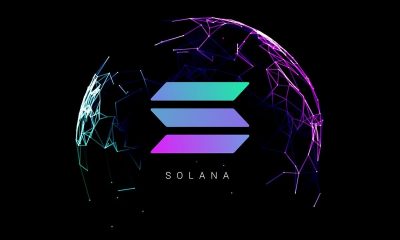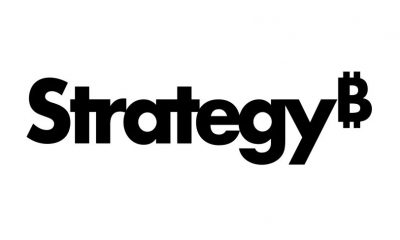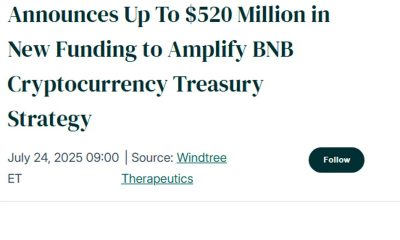

De-fi
Kyrgyzstan Is Moscow’s Crypto Backdoor to Dodge Sanctions, TRM Labs Warns – Crypto News
More than 90% of illicit crypto flowing into Kyrgyz exchanges is tied to sanctions evasion, with analysts citing growing links to Russian paramilitary and darknet actors.
Kyrgyzstan’s rapid crypto expansion has become a sanctions workaround for Moscow, with analysts at blockchain forensic firm TRM Labs claiming that Russian actors are actively using Bishkek-registered shell crypto exchanges to “procure dual-use goods since the outset of the war in Ukraine.”
In a recent blog post, analysts noted that many crypto providers registered in Kyrgyzstan exhibit classic shell company traits, including identical apartment addresses, recycled founders, and even copy-pasted emails.
Moreover, several of these Kyrgyz exchanges exhibit “similar on-chain heuristics to Garantex,” the blacklisted Russian crypto exchange sanctioned by the U.S. Treasury for facilitating sanctions evasion and darknet market activity before its takedown by law enforcement in March 2025.
According to data from the New York-headquartered blockchain forensics firm, more than 90% of illicit crypto inflows to Kyrgyz-registered exchanges from February 2022 to July 2025 were tied to sanctions-related activity.
“Since Russia’s invasion of Ukraine, US, UK, and EU sanctions authorities have consistently targeted Russia’s illicit finance ecosystem—including sanctions evasion, money laundering networks, darknet markets, and non-compliant exchanges,” Ari Redbord, vice president and global head of policy and government affairs at TRM Labs, told The Defiant.
Redbord added that when a jurisdiction is repeatedly associated with such activity, it “raises the risk of broader regulatory action, whether through increased scrutiny, de-risking by major financial institutions, or even country- or sector-level restrictions.”
“It’s a reminder that gaps in compliance don’t just pose a reputational risk — they can become national-level economic vulnerabilities,” Redbord explained.
Shared Control
TRM Labs notes that shortly after Garantex was shut down, a spinoff called Grinex emerged and began using “the same spending heuristic previously associated with Garantex.”
“In May 2025, TRM Labs reported that Grinex facilitated the movement of funds from Garantex by enabling withdrawals via Russian stablecoin A7A5. Users with balances exceeding USD 50,000 were able to extract funds through Grinex using A7A5 shortly after Garantex’s takedown by law enforcement,” the firm said.
Additionally, TRM Labs analysts say wallet infrastructure across Kyrgyz exchanges suggests “shared control or coordination.” Some, like Envoys Vision Digital Exchange, even have exposure to groups such as Rusich, a Russian paramilitary unit sanctioned in 2022 for having “participated in combat alongside Russia’s military in Ukraine.”
TRM Labs links Kyrgyzstan’s crypto surge to a 2022 law that granted tokens property rights, clearing the way for 126 registered platforms by late 2024. The warning signs are clear, they say, as crypto-clueless founders and platforms that skip KYC point to “classic hallmarks of a coordinated network designed to obfuscate illicit flows.”
-

 Blockchain5 days ago
Blockchain5 days agoInstitutional Demand Surges As Ethereum Sets New Inflow Records – Crypto News
-

 Blockchain5 days ago
Blockchain5 days agoDeFi Development Nears 1 Million Solana In Treasury – Crypto News
-
Business1 week ago
XLM Is More Bullish Than ETH, SOL, And XRP, Peter Brandt Declares – Crypto News
-

 Cryptocurrency1 week ago
Cryptocurrency1 week agoAnarchy, crime and stablecoins – Blockworks – Crypto News
-

 Cryptocurrency1 week ago
Cryptocurrency1 week agoAltseason heats up, but Bitcoin could face short-term pullback – How? – Crypto News
-
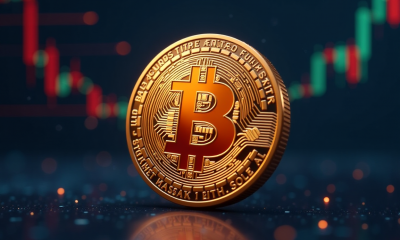
 Cryptocurrency1 week ago
Cryptocurrency1 week agoBitcoin trades near $119K after new all-time high; Coinbase rebrands wallet to ‘Base App’ – Crypto News
-
Technology1 week ago
“Decentralized Ponzi Scheme”- Gold Bug Peter Schiff Slams Landmark Crypto Bills – Crypto News
-

 Cryptocurrency1 week ago
Cryptocurrency1 week agoCalifornia Sheriffs Believe 74-Year-Old’s Disappearance Linked to Son’s Crypto Fortune – Crypto News
-
Business6 days ago
Vitalik Buterin Approves Gas Limit Hike, Warns Against Risky Ethereum Scaling – Crypto News
-

 Metaverse1 week ago
Metaverse1 week agoZoho Zia LLM launched with speech-to-text models and AI agent marketplace: All you need to know – Crypto News
-

 De-fi1 week ago
De-fi1 week agoBNB Chain Teases New Blockchain with Privacy Features to Compete With Crypto Exchanges – Crypto News
-
Technology1 week ago
Breaking: GENIUS Act Becomes First Major Crypto Legislation as Trump Signs Bill – Crypto News
-

 De-fi1 week ago
De-fi1 week agoCrypto Market Cap Hits $4 Trillion Milestone as US House Passes Landmark Bills – Crypto News
-

 Cryptocurrency1 week ago
Cryptocurrency1 week agoShytoshi Kusama Breaks Silence on New SHIB AI Whitepaper and Transformed Future – Crypto News
-

 Cryptocurrency7 days ago
Cryptocurrency7 days agoSanctum acquires Ironforge, plots transaction infrastructure vertical – Crypto News
-

 Cryptocurrency6 days ago
Cryptocurrency6 days agoXRP Price Hits All-Time High at $3.66 — Can It Smash Through $4 After Trump Win & SEC Shake-Up? – Crypto News
-

 Blockchain6 days ago
Blockchain6 days agoHow to Use Google Gemini to Turn Crypto News Into Trade Signals – Crypto News
-

 others6 days ago
others6 days agoEUR/CHF rises on speculation of SNB intervention, but EU–US trade risks cap gains – Crypto News
-

 Blockchain5 days ago
Blockchain5 days agoStrategy to keep STRC Fund Pegged to $100 – Crypto News
-

 others1 week ago
others1 week agoGBP/USD rallies on US PPI dip and Trump’s potential Powell removal – Crypto News
-

 others1 week ago
others1 week agoGBP/USD rallies on US PPI dip and Trump’s potential Powell removal – Crypto News
-
Cryptocurrency1 week ago
Russia’s $85 Billion Sberbank to Launch Crypto Custody Services – Crypto News
-
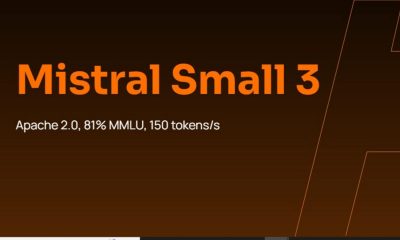
 Technology1 week ago
Technology1 week agoEurope’s answer to ChatGPT? Mistral adds voice and research features to Le Chat AI – Crypto News
-
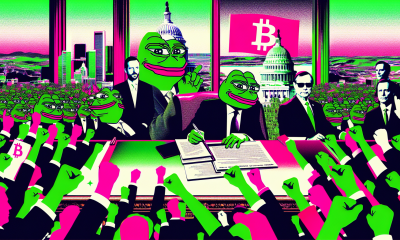
 De-fi1 week ago
De-fi1 week agoU.S. House Passes Clarity, GENIUS, and Anti-CBDC Acts With Historic Bipartisan Support for Crypto – Crypto News
-
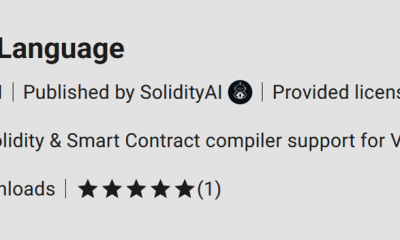
 Technology1 week ago
Technology1 week agoMalicious code found in fake coding extensions used to steal crypto – Crypto News
-

 Cryptocurrency1 week ago
Cryptocurrency1 week agoXRP Price Spikes to Record Highs As Momentum Signals Extended Gains – Crypto News
-

 Technology1 week ago
Technology1 week agoMeta’s AI Studio: Red flag or red herring? – Crypto News
-

 Blockchain1 week ago
Blockchain1 week agoWhy Bitcoin self-custody is declining in the ETF era – Crypto News
-

 Cryptocurrency1 week ago
Cryptocurrency1 week agoUS House passes three key crypto bills; market reaction muted as Bitcoin dips – Crypto News
-

 De-fi1 week ago
De-fi1 week agoCrypto Market Cap Hits $4 Trillion Milestone as US House Passes Landmark Bills – Crypto News
-

 Cryptocurrency7 days ago
Cryptocurrency7 days agoArthur Hayes-linked wallet bags $2M worth of AAVE and LDO in an OTC deal – Crypto News
-
others7 days ago
Why Is The Crypto Market Rising Today? – Crypto News
-
others6 days ago
Breaking: Polymarket Reenters US Market With Exchange Acquisition As Probe Ends – Crypto News
-

 others5 days ago
others5 days agoVenture Capital Firms Launch $360,000,000 Crypto Treasury Company Focused on Arthur Hayes-Backed Ethena (ENA) – Crypto News
-

 Cryptocurrency5 days ago
Cryptocurrency5 days agoSolana Clinches 5-Month High, Where to From Here? – Crypto News
-
Technology5 days ago
BitOrigin Begins $500M Dogecoin Treasury With 40.5M Buy, Analysts Predict Fresh Bull Cycle – Crypto News
-

 Technology5 days ago
Technology5 days agoGrab up to 43% off on best selling premium laptops from Apple, Asus and more – Crypto News
-

 Blockchain5 days ago
Blockchain5 days agoXRP Could Skyrocket 500% Against Bitcoin, Analyst Warns – Crypto News
-

 Blockchain5 days ago
Blockchain5 days agoCrypto Needs Minimum Viable Decentralization – Crypto News
-

 Blockchain1 week ago
Blockchain1 week agoNasdaq Exchange Files SEC Form to List Staking Ethereum ETF – Crypto News
-

 Cryptocurrency1 week ago
Cryptocurrency1 week agoEthereum price surges 6% to $2,800 as shorts suffer amid $500M crypto liquidation – Crypto News
-

 Technology1 week ago
Technology1 week agoOnePlus Pad 3 with Snapdragon 8 Elite SoC makes its India debut, set to go on first sale in September – Crypto News
-

 others1 week ago
others1 week agoStreaming Service Handing $3,400,000 To Current and Former Customers To Settle Illegal Data Harvesting Allegations – Crypto News
-

 Cryptocurrency1 week ago
Cryptocurrency1 week agoFriday charts: Fiscal dominance and super intelligence – Crypto News
-

 De-fi1 week ago
De-fi1 week agoTrump’s Crypto Assets Now Comprise a Key Part of Family Fortune Worth Billions – Crypto News
-
Business1 week ago
Pi Coin Price Technical Analysis Confirms Buy Signal Despite 2M Exchange Inflows – Crypto News
-

 Technology1 week ago
Technology1 week agoNot Google or Bing! This search engine lets you block AI images in search results – Crypto News
-
Cryptocurrency1 week ago
GENIUS Act Is The Catalyst For XRP And RLUSD’s Dominance, Expert Declares – Crypto News
-

 De-fi7 days ago
De-fi7 days agoNasdaq Files to Add Staking to BlackRock’s ETH ETF – Crypto News
-

 Blockchain6 days ago
Blockchain6 days agoTo The Moon? Justin Sun To Be Launched Into Space After $28M Bid – Crypto News

